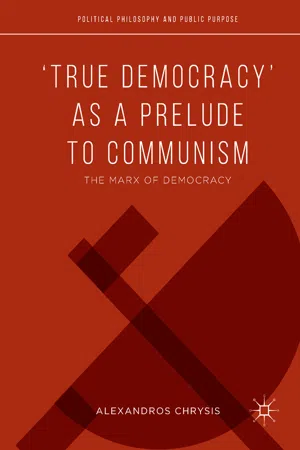Undoubtedly, the concept of ‘ democracy’ is one of the most disputed and debated issues in the political theory and practice of all historical epochs. This is also the case in the context of Marxist theory and the political movements that it inspired: democracy , as both theory and practice, has never ceased to be a controversial subject within the fields of Marxist-oriented research inquiry, interpretation and political practice.
This study, which is part of a wider research project, attempts to answer the following questions:
What is the content that Marx attributes to the term ‘democracy’ in his early work—that is, before he embraced the communist project?
What is the inner relationship between the pre-communist Marxist theory of democracy and the quest for self-determination as formulated by Marx in his early work?
I attempt to show that these questions are anything but academic. Democracy is a major theme in the history of ideas and cuts across political theory and practice over time. One way or another, these ideas and practices have drawn on the theories of classical times, and have faced challenging interpretations and adaptation by theoreticians and politicians alike. In this context, it is clear that both the durability and the inner relationship inherent in the bipolar connection between democracy and emancipation anything but contingent. In essence, they are the expression of an existential need in human beings for liberation, emancipating themselves from any form or source of heteronomy . In all circumstances, and especially in periods of economic, social and cultural crisis—as indeed is the case at present—the development of a systematic theoretical effort to understand democracy and emancipation is inextricably connected to current social struggles and people’s need for what we sometimes euphemistically call ‘a better world’.
Having said this, we must admit that it is impossible to reach into the very core of the Marxist theory of democracy if we fail to tackle the broader philosophical issue of human autonomy as it arises from the ancient Greek cultural determinants of the young Marx’s thinking. Broadly speaking, Marx’s theory of democracy can be found in his doctoral dissertation , where the form-symbol of Prometheus breaks away from any god—that is, from any agency of heteronomy—contextualising the self-determination of human agency as the supreme attitude and value of life: ‘In simple words, I hate the pack of gods’ (Aeschylus, Prometheus Bound). From this perspective, Georg Lukács is not far off the mark when he argues that elements of a ‘political programme’ already exist in Marx’s doctoral dissertation, elements that, starting from his articles in Rheinische Zeitung , find their culmination and scholarly elaboration in his later writings.1
The fact that I refer to the themes of democracy and emancipation in the early work of Marx as they relate to ancient Greek philosophy is not due to any obsession I have with ancient Greek literature. When exploring the theme of ‘Marxism and democracy’, I tend to believe that it would be a major theoretical mistake—and, ultimately, a political mistake—to underestimate or, even worse, to ignore Marx’s own multiple interests in ancient Greece , in Aristotelian and post-Aristotelian philosophy, or even in ancient tragedy, which is a form of art closely connected to the rise and fall of Athenian democracy . The mistake that results from such a faulty approach takes on even greater dimensions when we reach the point where we ignore the fact that democracy and emancipation are not technical or institutional questions for both the young and the communist Marx, but questions that are determined both historically and ontologically. We therefore have to factor in ‘human nature’ if we do not want to produce a disastrous Marxist political theory accompanied by an equally disastrous ‘liberating’ political practice.2
Equally problematic is the underestimation of the direct or indirect influence of the ideas of the European Enlightenment on Marx’s thought, as well as the misinterpretation of political texts organically connected with the French Revolution and with nineteenth-century political movements all over Europe.3
There is no doubt that the relationship between Marx’s pre-communist and communist theory on the one hand, and the ideas of the Enlightenment and the French Revolution on the other, is multifaceted and complex. This is why the dynamics of this relationship in history are destined to be re-examined and reconsidered continually. In any case, a clear distinction must be made between Marx’s relationship as a thinker of the Hegelian Left with seventeenth- and eighteenth-century political theories and practices and the way in which Marx conceives the same theories and practices once he becomes a communist, a theoretician of the class struggle and of the critique of political economy in which he attempts to relaunch the theoretical nexus between politics and economics, society and the state .
The relationship between Marxism and the Enlightenment has been tested over the years, exposing all those organic intellectuals and left-wing practitioners, not to mention the bureaucrats, who have wished to interpret it in a simplistic, tout court manner. I therefore wish to state the following at the outset: the enigma of democracy , as a form of transition to socialism and as a form of organisation of a socialist society and its political avant-garde per se, has not been solved. The reasons for this failure are multiple. Within the context of a history of ideas and movements, I would argue that this failure is undoubtedly due in part to misunderstandings between Marxism and Enligh...
